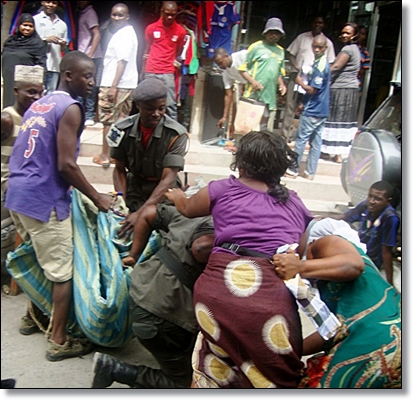Tanzania's Street Hawkers: An Economic Potential

 |
She was delivering her speech during the one day workshop that was organized by the Growth Research Programme (GRP) in collaboration with the Policy Research for Development (REPOA), under the theme “Shaping Economic Transformation in Tanzania: Challenges and Potential Solutions.”
Prof. Brown challenged Tanzania to borrow a leaf from Kenya where the ‘jua kali’ (as petty traders are known) and in so many other places whereby the petty traders have been gradually streamlined into their countries’ economic set up. “Instead of harassing them, they should be streamlined into productive ventures, they can contribute enormously to the country’s economy once there is an appreciation of their contribution,” she defended.
Expounding on how the Government should tackle them, Prof. Brown said that there are a variety of strategies that can be used. For instance, one strategy is to ensure that they are allocated in permanent areas in order to develop clientele relationships. The main areas that she suggested are: to know the urban economic potentials where this population can be properly fit in, knowing the small scale businesses around the urban areas, and the potential dynamics of the contributions of these subsectors.
“They need to be integrated to the realm of microfinance, let them have a choice, allow them to have savings, and make them meet their pertinent demands, with these elements they will start to earn their incomes smoothly,” she commented. She revisited the historical trend where every effort was made to make them go back to their roots in the rural sector, and concluded that this has eventually proved not to be a permanent solution because it is the same Government that is turning into commercial agriculture which to a large extent has reduced land shares to peasant farmers.
“The main questions now are; to know who is using what, and find ways of institutionalizing this group into formal banks, Savings and Credit Co-operatives (SACCOs), and other small productive groups the types of Village Community Bank (VICOBA) and Village Savings and Loan Associations (VSLAs)” She suggested.She also added that petty traders can accumulate capital over time and engage themselves in forming small companies; they can as well be trained to produce items like soap or even owning Bajaj, a tricycle motor bike. She also suggested of mobile banks through mobile phone companies like M-Pesa, Airtel Money and Tigo-Pesa.
She therefore called for their legal recognition and proper identifications so that they can access the world of mortgages so that Micro Finance Institutions (MFIs) can recognize them. She revealed that currently petty traders cannot access soft loans because they fear debts and they are not officially recognized in the mainstream production sectors.
Reacting to the presentation Ms. Falecia Masaki, an industrial policy analyst from the Ministry of Industry and Trade appreciated that this was a good food for thought idea, but it depends entirely on political decisions. While she did not dwell much on how politics is linked, but it is a well-known fact that in Tanzania, all areas of accumulations of the petty traders are as well strong political bases of the opposition parties.
Dr Blandina Kilama, contributing to the debate, said that there have been major transformations in the banking sector due to the fact that they have to adjust and regulate themselves to the competitions and nature of financial operations accordingly. She said that her institution REPOA has conducted researches on how these banks operate and found that the classical banks like CRDB, AKIBA and NBC had to adjust themselves in the wake of other key players like the Pension Funds and mobile phone companies.
For his part Msafiri Mgimwa from Pamoja Twajenga Project, said that the Tanzanian Government should create more enabling environment for small producers and give them a space so that they can enhance a country’s economy into robust one.
The question of handling street vendors has been criticized several times by politicians, experts and other stakeholders. It has been argued that they must be empowered in order to reduce the crime rate, but on its part the Tanzanian Government has been responding that preparation are under way but what is lacking is finance for funding their projects.
By Elias Mhegera
The author is a Dar es Salaam based political communicator and business editor, he is currently a features editor with a weekly broadsheet Business Times in Dar es Salaam his contacts are mhegera@gmail.com cellular: 255-(0)754826272
